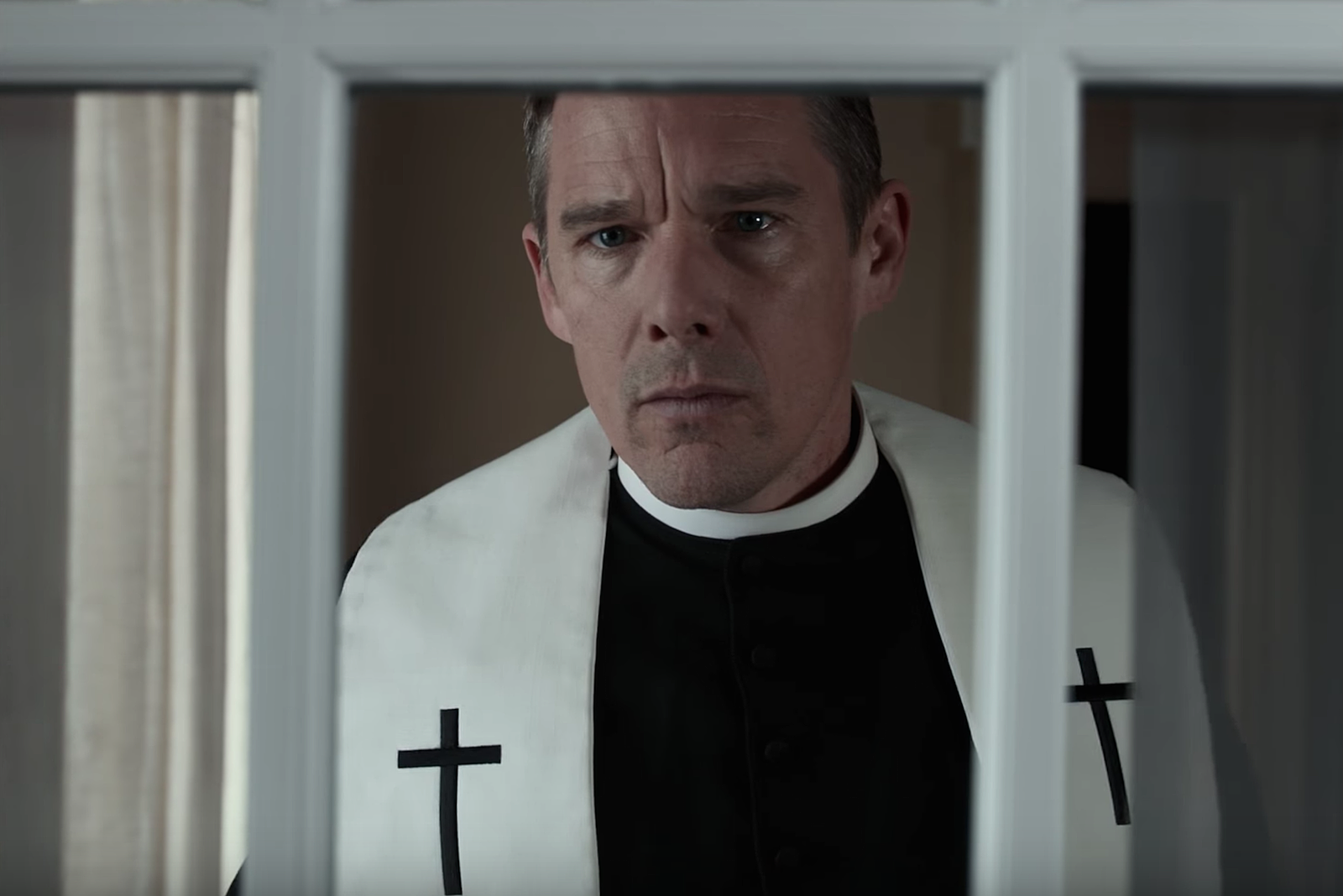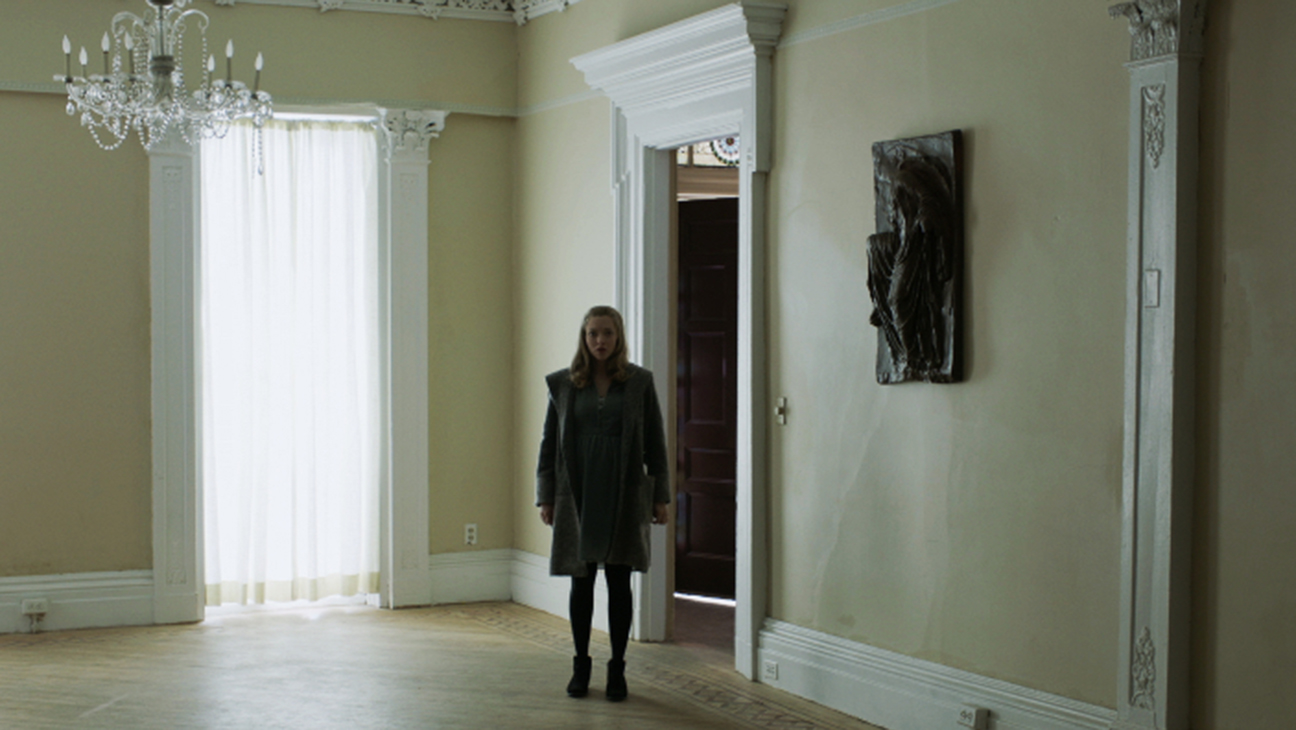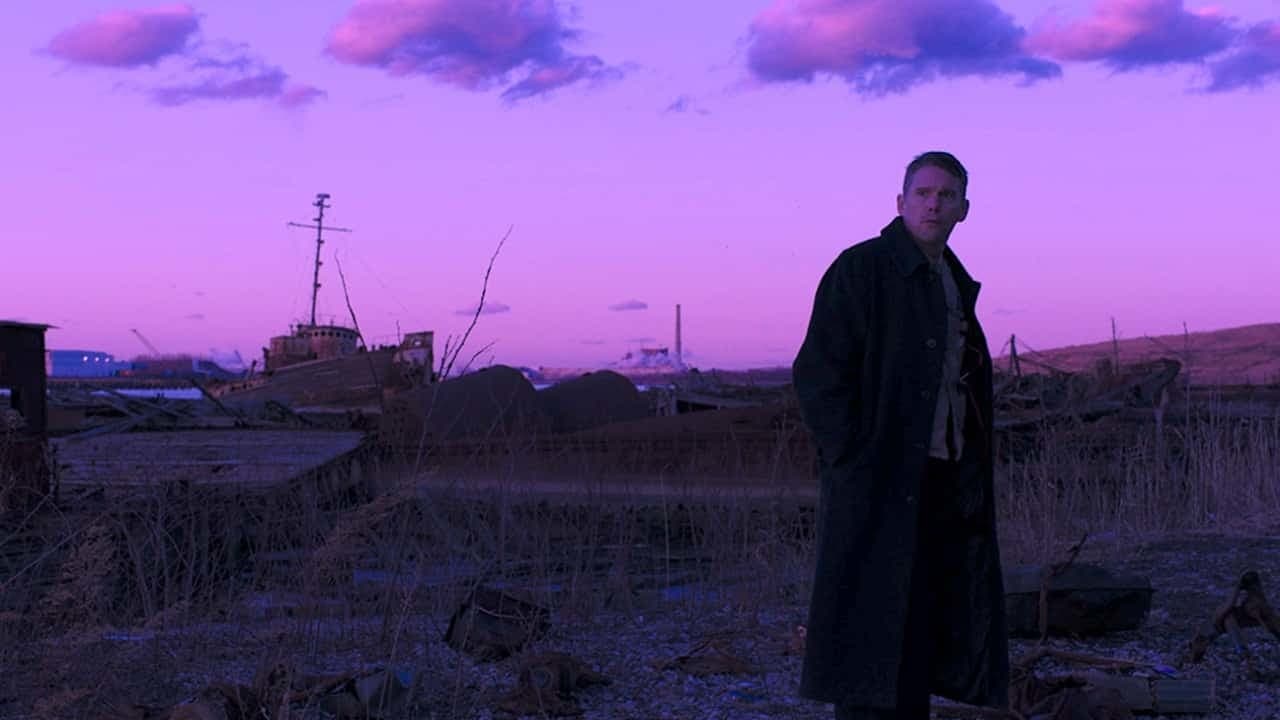One of cinema’s great ironies is that, for all the talk of representation and making the hidden visible, much of its power comes from withholding instead. Certainly this is true of slow cinema, of that poetic tendency which, in his landmark 1972 treatise, Paul Schrader called “the transcendental style in film.” The eternally self-lacerating Taxi Driver scribe’s brilliant latest, First Reformed, deserves a chapter in the updated edition – and the boxy image of a despairing reverend, mixing whiskey and Pepto Bismal while researching suicide vests on a laptop in a parsonage, should go on the cover. It withholds to the point of perversity, before exploding in swirling rapture.
Ethan Hawke plays that man of God, Rev. Toller. A former military chaplain now presiding over a parish so antique it’s a literal museum and giftshop, Hawke’s face is a faded text, struck through with loss, spare as a sketch on a ruined wall. First Reformed is the historic church itself: once a New York way station for the Underground Railroad, it’s a souvenir relic, barely staffed, rarely prayed in, mostly notable for its graveyard and currently broken pipe organ, limping to its 250th anniversary in the shadow of the corporate mega-church that funds its upkeep.
 We know Toller is a broken man long before we hear about his past. With a nod to Bresson, he has determined to keep a journal, in long-hand, recording his days with brutal honesty for exactly one year, after which it will be destroyed. The Thomas Merton enthusiast has no ambitions to publish or reveal himself to the world; it’s a “project,” his word, though what it’s for remains nebulous. He’s a priest who has trouble praying; the existentialist in him thinks the written word will mark a genuine engagement, “another kind of prayer.”
We know Toller is a broken man long before we hear about his past. With a nod to Bresson, he has determined to keep a journal, in long-hand, recording his days with brutal honesty for exactly one year, after which it will be destroyed. The Thomas Merton enthusiast has no ambitions to publish or reveal himself to the world; it’s a “project,” his word, though what it’s for remains nebulous. He’s a priest who has trouble praying; the existentialist in him thinks the written word will mark a genuine engagement, “another kind of prayer.”
We are distanced again in First Reformed by the self-epistle – what was on the pages that have been torn out, what do we not get to read? Hawke’s affectless voiceover is no real help; the static Ozu stylizations – tatamis in the vestibule – refuse to editorialize; there’s no score; the 4:3 ratio (which Schrader fought for; his preferred black and white was a no-go) centers everything in obscuring symmetry. We lean in closer.
 The listlessness is broken up by the introduction of a pregnant parishioner, Mary (natch), played by Amanda Seyfried. Her husband is recently out of prison for unspecified activist infractions, likely some sort of environmental civil disobedience. Toller agrees to minister to him (the non-religious husband still prefers First Reformed to the resource-heavy Abundant Life, which is more “a business than a church”), and Schrader’s plotting comes into focus, slowly, slowly.
The listlessness is broken up by the introduction of a pregnant parishioner, Mary (natch), played by Amanda Seyfried. Her husband is recently out of prison for unspecified activist infractions, likely some sort of environmental civil disobedience. Toller agrees to minister to him (the non-religious husband still prefers First Reformed to the resource-heavy Abundant Life, which is more “a business than a church”), and Schrader’s plotting comes into focus, slowly, slowly.
First Reformed makes a few very good decisions here. As much as the tradition Schrader holds dear demands abstraction (“Religion and art are parallel lines which intersect only at infinity, and meet in God,” wrote Gerardus van der Leeuw), his films are very much of the earth. Here, this is taken to its literal conclusion: Mary’s husband knows, and can demonstrate with copious evidence, that we’ve passed the point of no return, climate change-wise. There were moments when we could’ve chosen differently, and we refused. Is this God’s creation? Well, we have destroyed it. How can a baby be born into this world, his baby? How will we look that child in their innocent eyes and tell them, “Yes, we knew, and we did it anyway”? Will God forgive us?
The husband is not long for this world, and he leaves behind a pregnant wife, a conflicted reverend, a cache of papers implicating everyone and everything, and a box of explosives in the garage. “Will God forgive us?” shows up on the whiteboard outside of First Reformed. The “reconsecration” of the church at 250 approaches, a media spectacle underwritten by moneylenders in the temple and local energy magnates. Toller’s physical illness matches the one in his soul, silently dipping bread into whiskey for breakfast in an ironic communion with God (and Bresson). As in the best of slow cinema, the boredom is thrilling. Something is coming, and we’re co-conspirators in a mission we can’t abort.
The other half of Schrader’s dialectic involves Seyfried’s Mary, a force of mystery and transcendence haunting the edges of Toller’s fractured solipsism. One scene involves a kind of magic of the flesh, a merging of carnal and sacred that makes emotional sense even as it shatters the formal austerity, not to mention anything like realism. “If you don’t break the rule you make,” Schrader notes, “how will anyone know there was a rule?” And in its closing moments, First Reformed evokes the film that made him famous … though its ambiguity has less in common with the cynical Scorsese of Taxi Driver than the rapturous Dreyer of Ordet. First Reformed is part of a conversation.
That conversation is out of time, in both senses. But with a head in the clouds and feet on the ground, First Reformed might just be Schrader’s masterpiece.

